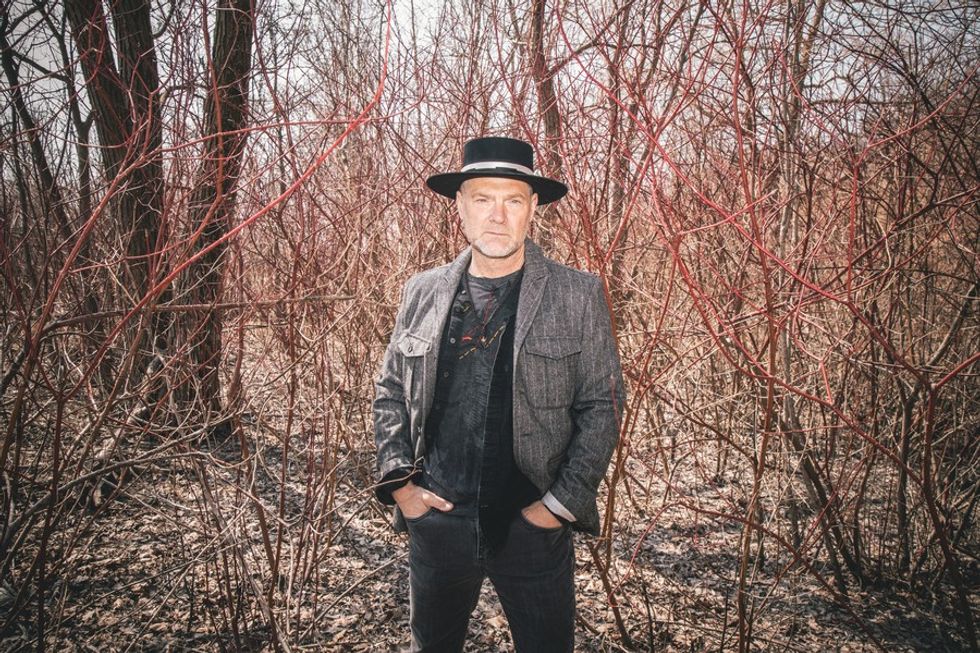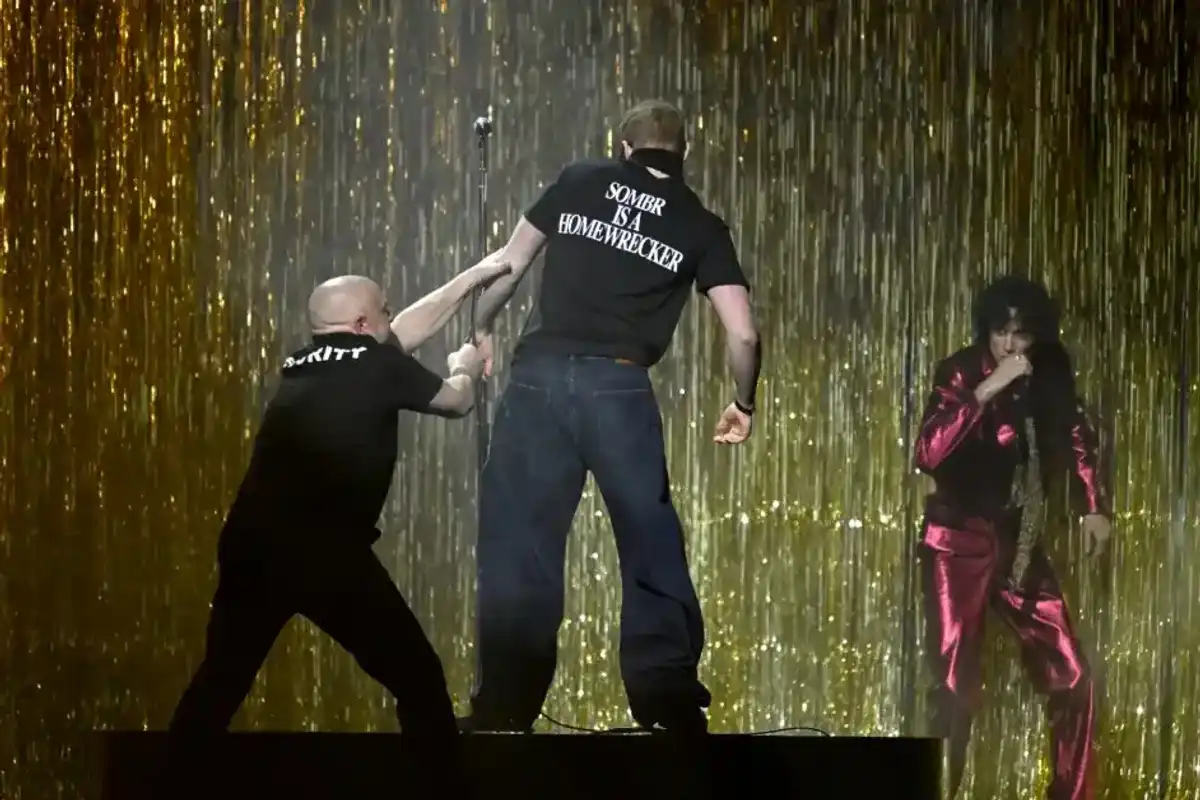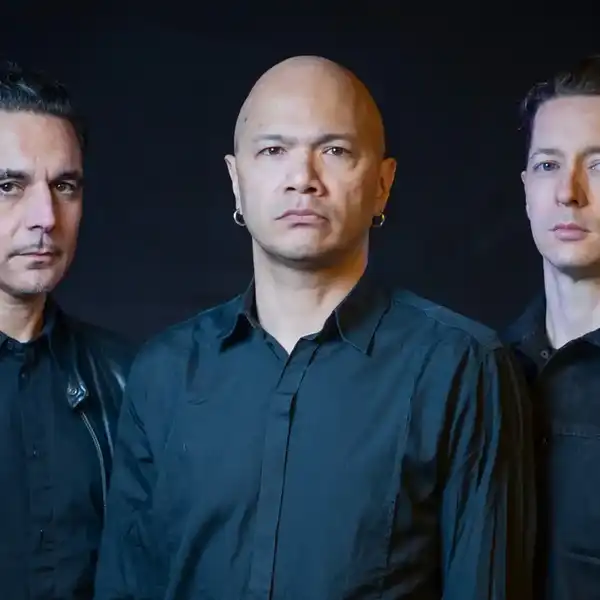A Conversation With .. Les Stroud
Best known for his hit TV show Survivorman, he is also an accomplished singer/songwriter and harmonica player. In this wide-ranging chat, he talks about his new record, Mother Earth, jamming with James Cotton, his admiration for Greta Thunberg, environmental activism, and love of Bob Dylan and Joan Baez.

By Bill King
Les Stroud and I met for a conversation in 2018, and, at the time, the questions steered more towards the King family fascination with the long-running series in which Les starred, Survivorman. I knew of Stroud’s penchant for the blues, and you could hear it in the backing music tracks and those moments Les would snatch a harmonica from a vest and lay down some campfire blues.
It was the kind of show that played at dinnertime and late-night – ideally situated for those of us who begged for an escape from breaking news and lame celebrity interviews. How did Les master that three camcorder technique – the setup, cameos, and walk backs to retrieve equipment and keep spirits high? With only the wilderness to dine on, how did Stroud get past the acrid taste of dead squid, succulent scorpions, and that vomit-inducing tubular? We asked, and Les graciously responded.
Last week Les returned for a second go-round, this time with a new recording – Mother Earth – looking fit and trim and fired-up. Some folks light up mornings; others shine all day. Here’s that conversation.
Bill King: You played with bluesman James Cotton during his last days.
Les Stroud: It was his eightieth birthday celebration. I also got to meet Steve Miller that night, who was very standoffish. It was like, yeah hi, then look away. Later I got to have the last laugh. I opened for James. I was then asked to jam with James’ band. Before then and in the dressing room, James and I jammed – two harmonicas.
B.K: Have you watched any of Ken Burn’s Country Music doc?
L.S: I saw it on the news and him talking about it but haven’t seen it yet. He does good docs.
B.K: When Charlie McCoy pulls out a harmonica and rips
L.S: That’s the amazing thing. You can’t think about original country music without the harmonica. It’s a different harp. It’s sweet and melodic but fast too. I remember bragging when hearing the guy playing on a Garth Brooks tune and thinking, I can play like that.
I’ve been able to play with some country stars, including Troy Gentry of Montgomery Gentry, before he passed away. I played with them at Ribfest – blowing harp. Country people love harmonica.
B.K: The new recording Mother Earth got me thinking about the young 16-year-old Swedish climate change activist Greta Thunberg and her speech at the U.N. – the “How dare you” moment and how it parallels your work and message conveyed through music.
L.S: Great observation, because you nailed it. I watched that clip recently, and it’s hard not to get emotional because she’s so emotional in that particular clip.
The guy who was writing the promotional blurb about my album wrote, “Les’s wearily pugnacious lyrics.” I’m thinking, is that a diss? – he’s supposed the be writing for me. Then I looked it up and now understand what he means. It was like inciting or evoking a battle, combat – a fight. Let’s talk about this.
She said it, “Shame on you. Shame on you for destroying my future – how dare you.” Those are fighting words, and I tried to put them in my album as well.
B.K: I read a piece a few days ago stating the most significant stress in young people’s lives is their concern for the environment. Will they inhabit a liveable planet?
L.S: It’s been a long slow burn in many circles. I was talking with George Stroumboulopoulos the other day, and he believes the next war is going to be fought over the Arctic and such. I think it’s going to be over the environment. The revolution will be an environmental revolution. I think, when young kids band together in that era and at that age between 19 and 23, you’re really into idealism and protesting. They are going to be fed up.
I think that’s what is going to lead to the next war because at some point – some country, let’s say the United States, is going to look at another country – let’s say Brazil and tell them, you can’t do what you are doing because you are hurting our lungs and that of the earth. That’s a significant concern with the Amazon forest burning. Other countries are going to get mad at other countries that are polluting and they are going to say, you are doing it too. I think we are going to get into this battle.
B.K: How do you pressure China?
L.S: That nation doesn’t wholly exist within the confines of that geographical boundary called China. It’s a mixed-up world in terms of our nationalities. We are everywhere. To say, India needs to stop or… you could be standing beside somebody who just came from India. There are lots of Americans in China. It’s getting messy.
It’s interesting and compelling what Greta is doing but I fear she will become the poster child for “isn’t she cute?" You can see the fire in her eyes. I recognize and she recognizes she’s on the autism spectrum, so she has a focus and demeanour that speaks of that, and I think that’s what will keep her focused and say, “don’t make me cute. That’s not me and that’s not why I’m here.” I love that about her.
B.K: We certainly don’t want her passion and commitment to get buried like the Parkland students who went to the frontlines demanding changes in gun laws only to see the cameras turn away and cover the next cycle distraction.
L.S: In discussion with my son Logan, I’m trying to figure out where my voice is. If you give me a beer or two, I will sit up in my seat – the tone in my voice will rise, I’ll channel Greta but at other times I think I should be careful. Then I ask myself why? I’m not politically correct in the first place.
The second I go out and see a big pile of garbage on some riverbank – even the Don River in Toronto – I’m pissed. Never mind being pugnacious, I’m going to invoke a revolution. I don’t know what the big answers are. All I know is when I go ocean diving, I see garbage.
B.K: With the success of Survivorman, you have a platform. You have broken survival down to the basics. For those of us who watched, you showed us what it was like to be on your own with the odds stacked against you. A higher percentage of people are now living in cities and their relationship with the wilderness is a brief sightseeing tour of the countryside.
L.S: With Survivorman, I wanted you to love nature again. I tried to get you back outside to see the trees again. Survival was just a fun way to facilitate this and show the skills. With my Mother Earth album, it’s the same Yin and Yang. Between my goals of Survivorman; I am sharing the beauty of nature, my goals as Les Stroud getting upset about the pollution in the environment, my purposes of writing a song like Arctic Mistress – which celebrates the beauty of the Arctic and starts with Inuit throat singing. I was taught and trained and spent so much wonderful time with them. Up Against One Gaint Farm with Slash playing the guitar solo says – “you hunt the dolphins, you kill the whales and bloodstains will splatter your sails.”
That yin and yang is an internal and constant debate I’m having with myself. Maybe it’s best to stay in the middle and be soft and gentle and show this beautiful little plant out here. I’m working on a new series called Wild Harvest for film. That shares the beauty of the plants you can gather and pick, and a five-star chef will show you how to make them in the kitchen until they are fantastic.
Over here, I’m jumping up on the boat the Sea Shepherd for a week. We are getting in the face of poachers who are firing at us. I keep dancing between those two worlds internally and in my art. I’m writing a new children’s book which is going to be softer.
B.K: I’m thinking about the visual memories you have stored from weeks in the wilderness and alone and how you can now recall them in words and lyrics. The songs' music write themselves.
L.S: Arctic Mistress is like that. I co-wrote with Brian Potvin of the Northern Pikes. It was Brian who came up with the idea while I was riffing off the Inuit throat singing I was doing with a rhythmic and chord structure and I started humming a melody. The lyrics of Arctic Mistress certainly speak to my mind’s eye, standing on a glacier in the high arctic when I was Survivorman.
B.K: How were the players chosen for the recording? Mindi Abair?
L.S: I’m blessed with a right place, right time, lucky situation. I was working with Noel Golden, a phenomenal engineer who worked with Guns N’ Roses, Chantal Kreviazuk, Rob Thomas, and all sorts of people – Matchbox Twenty. He’s an old friend from high school and we’ve been crisscrossing for years and got together and he started helping with these songs and said, you know who I think would like this – Mike Clink.
For me, not having been a child of the Guns N’ Roses, Pearl Jam era made me ask, who’s Mike Clink? He’s a Grammy award-winning producer who has worked with everybody, not just rock artists. I meet Mike and discover we are cut from the same cloth and hit it off. We’ve now done three albums together and it’s been over ten years I’ve been working on this album – starting with Survivorman and all of those journeys, meeting all of these indigenous cultures and travelling around the world, ceremonies and staying in jungles – that started it.
Mike took it and put it all together in this musically speaking package. The world-class sound is undeniable – that’s Mike Clink. I wanted some saxophone on the Mother Earth song at the end and he says well, I’ll call somebody. I’m like Mindi who? And he says Mindi Abair and she turns out to be amazing. He then asks if I’d be alright if he got Steve Vai to play? Of course.
Slash and I had a relationship before Mike Clink. I did a dolphin charity with Slash. Reggie Young is the bass player – the musical director at the Apollo Theatre in Harlem. Shannon Forrest is the drummer – the number one session drummer in Nashville. There was a time he was the drummer on all of the top ten songs on the charts. Chris Rodriguez, Tim Pierce on guitar out of LA.
The only reason Mindy, Steve Vai and Slash got involved was because of the message of the album. They heard the lyrics, saw the videos. Slash said he wanted to make sure the video got out.
B.K: The album release date?
L.S: November 2019. Two singles are out, One Giant Farm and Ancients Call. The next single is likely to be Life on Earth.
B.K: What is the path for this?
L.S: That’s such a great question. My nemesis is my ability to say it’s a rock album. If Mike Clink were sitting here, he would say it’s decidedly a rock album with some pop sensibilities and some song sensibilities. I would say it’s progressive rock – Mike hates that when I say it. Short answer, it’s a rock album.
B.K: Watching Bob Dylan and Johnny Cash together playing songs that have a serious tone in front of a world audience validates the message in those songs and the evolution of country-rock. They were able to speak for and to a growing audience with fresh ears in need of moral and musical leadership. I’m thinking you are coming at this in a unique moment in contemporary history with a 16-year-old on the world stage speaking of the same issues presented in your music.
L.S: I had this discussion with Mike – why can’t we call it environmental rock or earth music? He didn’t like that.
B.K: That’s not thinking ahead.
L.S: That’s interesting. Before I dropped in for this interview, I went over to Bob’s Coffee or whatever it’s called now – The Davenport; great coffee and do you know what he was playing? Joan Baez on Spotify. Do you want to talk protests? Joan Baez was a protest singer in the spirit of Woody Guthrie.
With Mother Earth, you are hitting the nail on the head; am I a twenty-three-year-old rapper? No! I’m a guy with a message. My message is true to where I come from – honestly and passionately. The proceeds of One Giant Farm go to the Sharkwater Foundation/Dolphin Project and Sea Shepherd.
I love, love songs – fun entertaining music. We talked about James Cotton earlier- the blues - but I’ve always had a passion for music that has a message, that says something. Lyrics have always done something for me. When you are seventeen, they aren’t so cheesy. It’s like, hey man, he gets me. I like that a lot. I can’t write fluffy lyrics, they have to mean something, so the likes of Joan Baez and Bob Dylan resonate with me.

















